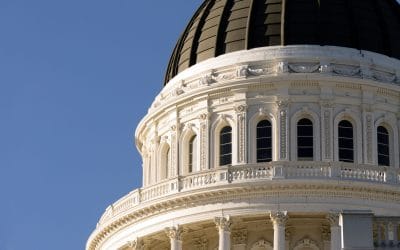Capitol Advisors Group has produced a series of comprehensive client briefs detailing new education laws that were passed by the Legislature and signed into law by Governor Brown in 2017. Each brief is organized by subject area and includes an executive summary highlighting major changes we think you should know about. Bills signed by the Governor take effect on January 1, 2018, unless the bill specifically states otherwise. A PDF version of this report is available here.
Local Reserve Cap Changes. SB 751, by Senator Jerry Hill (D-San Mateo), marks the end of a three-year battle over the local reserve cap, which was part of a deal between the Governor and the California Teachers Association (CTA) related to Proposition 2 (Rainy Day Fund). The California School Boards Association (CSBA) and CTA reached a compromise that changes the reserve cap “trigger” so that it is even more remote (it does not apply until after an accumulation of at least three percent of the Proposition 98 guarantee in the Proposition 98 “reserve”), along with other provisions that exempt small school districts (ADA less than 2,501) and basic aid districts. The cap, if it is triggered, would be 10% and applies to assigned and unassigned ending balances in the general fund. With the compromise reached among the parties and members of the Legislature, Governor Jerry Brown signed the bill, which should take this volatile issue “off the table” for many years.
No COLA for Home-to-School Transportation. SB 527, by Senator Cathleen Galgiani (D-Stockton), would have established an annual cost-of-living adjustment (COLA) to the amount of funding that school districts and county offices of education receive from the Home-to-School Transportation (HTST) program. Governor Jerry Brown vetoed the bill, citing the funding and flexibility provided under his school funding formula (the LCFF). It is likely the Governor did not want to revisit the funding deals negotiated during the development of the LCFF, including the “add-on” funding for HTST and the Targeted Instructional Improvement Grants (TIIG).
No CTE Funding Beyond the 2017-18 Budget. One bill of note that did not make it to the Governor’s desk was AB 445 by Assembly Member Jordan Cunningham (R-San Luis Obispo). This bill would have added $100 million to the current $200 million in one-time funding for Career Technical Education (CTE) in the 2017-18 state budget, and would have extended that $300 million in total CTE funding for an additional three years. Under current law the $200 million in the 2017-18 budget constitutes the final funding for the CTE Incentive Grant program. Though unsuccessful, AB 445, with 20 joint and co-authors representing both sides of the political aisle, established the fact that continuing CTE funding is a clear legislative priority that will be debated in the near future.
State Budget and related trailer bills. The annual Budget Act is the single most important piece of legislation acted upon by the Legislature and the Governor each year. The state’s budget cycle runs from July 1 to June 30. The budget process begins with the Governor’s Budget, proposed in January of each year, and culminates with the Governor’s signing of the Budget Act, which is constitutionally required to pass out of the Legislature on or before June 15. The budget process also includes a number of budget trailer bills that are passed and signed into law; budget trailer bills enact the statutory changes necessary to implement the annual Budget Act, and often include substantive changes in state policy.
2017-18 Budget. The Budget Act (AB 97) and Education Omnibus Trailer Bill (AB 99) contain almost all K-12 expenditures for the 2017-18 fiscal year. General Fund spending for 2017-18 is $125.1 billion, with a total of nearly $10 billion in General Fund reserves by the end of the fiscal year. Following are some of the key K-12 education spending provisions of the 2017-18 budget package:
- $1.36 billion increase for LCFF (about 42% of gap)
- $877 million in one-time discretionary funding (about $147 per ADA)
- $376.2 million for Prop 39 energy grants
- $200 million (one-time) for CTE incentive grants (per 2015 Budget Act)
- $135.8 million for Preschool and Early Childhood Education
- $76.5 million to provide 1.56% COLA to some categorical programs
- $50 million increase for After School Education and Safety Program
- $30 million for tobacco/nicotine prevention programs (Prop 56)
- $25 million (one-time) for Classified Employee Credential Program
- $15.4 million for CTE Pathways (SB 1070 K-12 CTE programs)
- $10 million for reducing truancy/drop out rates (Prop 47)
- $10 million (one-time) for Refugee Student Support
- $7 million for COE LCAP support
The Governor signed the following bills related to school finance this year:
School Finance
- AB 341 (Frazier) – School field trips: expenses
This bill eliminates the current prohibition against the use of school district funds to cover the expenses of pupils participating in field trips or excursions to other states, the District of Columbia, or a foreign country.
Chapter 40, Statutes of 2017 - AB 760 (Arambula) – Pupils: minimum school day: concurrent enrollment: joint powers agreement
This bill deletes a July 1, 2018 sunset, which makes the current funding formula permanent for school districts with pupils attending the Center for Advanced Research and Technology (CART). The formula set the minimum school day at 180 minutes and includes requirements for immediate supervision of students by certificated employees.
Chapter 47, Statutes of 2017 - AB 1550 (Limón) – School finance: school bonds: small school district
Current law allows governing boards of school districts to authorize, issue and sell bonds for a number of purposes. This bill authorizes small school districts (fewer than 2,501 ADA) to form joint powers authorities (JPAs) for the purpose of authorizing, issuing, and selling bonds.
Chapter 451, Statutes of 2017 - SB 141 (Nguyen) – Personal income taxes: exclusion: loan discharge
This bill updates references in Personal Income Tax Law that provide for various exclusions from gross income, including for the discharge of student loan indebtedness because an individual could not complete a program of study due to the school be closed under certain federal regulations.
Chapter 71, Statutes of 2017 - SB 450 (Hertzberg) – Public bodies: bonds: public notice
This bill requires the governing body of a public body to obtain and disclose in a public meeting specified information regarding the issuance of bonds, including good faith estimates from an underwriter, financial advisor, private lender or third-party borrower regarding the true interest cost and finance charge of the bonds.
Chapter 625, Statutes of 2017 - SB 503 (Newman) – Personal income taxes: voluntary tax contribution funds
This bill renames and extends the sunset date, until January 1, 2025, for both the Keep Arts in Schools Voluntary Tax Contribution Fund (VCF) and the Protect Our Coasts and Oceans VCF, and makes conforming changes.
Chapter 519, Statutes of 2017 - SB 751 (Hill) – School finance: school districts: annual budgets: reserve balance
This bill exempts small (2,501 ADA or less) and basic aid school districts from the reserve cap, and changes the cap on school district reserves for all other districts to 10% for each year following a deposit (or balance) in the Public School System Stabilization Account of an amount that exceeds three percent of total Proposition 98 funding for schools for that fiscal year. AB 751 also specifies that the cap only applies to assigned and unassigned ending balances in general fund accounts and special reserve fund for other than capital outlay projects.
Chapter 674, Statutes of 2017
Public Contracts
- AB 92 (Bonta) – Public contracts: payment
This bill extends from January 1, 2018, to January 1, 2023, the sunset date on existing statutes governing the amount of money a public agency can retain from a contractor or subcontractor prior to completion of a public works project. Applicable existing law prohibits a public agency from retaining more than 5% of a contract price until final completion of a project, but provides an exception from the above prohibition by allowing a public agency to withhold more than 5% of the contract price if a project is deemed to be substantially complex, provided that the bid documents describe the specific project, explain why it is substantially complex, and identify the actual retention amount.
Chapter 37, Statutes of 2017 - AB 618 (Low) – Local Agency Public Construction Act: job order contracting: school districts: community college districts
The Local Agency Public Construction Act authorizes job order contracting for school districts until January 1, 2022. The act restricts job order contracting to school districts that have entered into a project labor agreement or agreements, as defined, that will apply to all public works in excess of $25,000 undertaken by the school district through 2021, regardless of what contracting procedure is used to award that work. This bill would revise that restriction to restrict job order contracting under the act to school districts that have entered into a project labor agreement or agreements that will apply to all public works awarded through job order contracting and to all other public works that exceed a monetary threshold set by the school district.
Chapter 296, Statutes of 2017 - SB 418 (Hernandez) – Public contracts: skilled and trained workforce
Under existing law, public works projects that utilize design-build, best-value, and lease-leaseback delivery methods require contractors and subcontractors at every tier to employ a “skilled and trained workforce,” meaning journeypersons who have graduated from state-approved apprenticeship programs. For work performed on or after January 1, 2017, at least 30% of the skilled and trained journeypersons on a project must be graduates that fall within the definition above. The law requires these percentages to increase each year, as follows: 40% in 2018, 50% in 2019, and 60% in 2020.SB 418 amends the 40%-50%-60% escalations to exempt work performed in the following occupations: Acoustical installer, bricklayer, carpenter, cement mason, drywall installer or lather, marble mason, finisher, or setter, modular furniture or systems installer, operating engineer, pile driver, plasterer, roofer or waterproofer, stone mason, surveyor, teamster, terrazzo worker or finisher, and tile layer, setter, or finisher. In other words, these occupations will not increase from 30% to 40% on January 1, 2018, and so forth. They are still subject to the 30% requirement.Chapter 393, Statutes of 2017




0 Comments